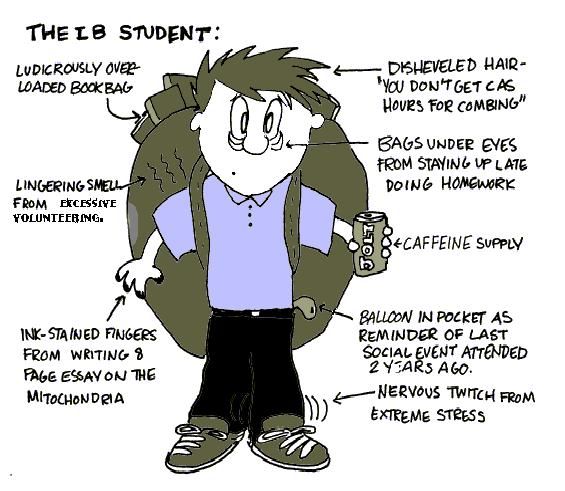By Victoire Heyworth, Year 12
Most of the reactions I get after telling students about my subject choices are: “Are you okay?”, “You are crazy”, “I can’t even imagine”. Although these responses seem terribly exaggerated, they aren’t totally wrong. The combination of internal assessments, extended essays, exams, and tests does indeed affect everyone at one point or another.
I once asked a student who had just graduated: “Would you do it again?” and she replied: “You couldn’t pay me to do the IB again!”
I conducted a small experiment last summer, in order to give myself a global view of the IB, and not just from our students’ perspectives. If you look up “international baccalaureate” on TikTok, the first search suggestions you get are: international baccalaureate meme, international baccalaureate trauma, international baccalaureate VS A levels, etc.
After clicking on the “meme” search, most of the content mocks IB students’ restlessness, their so-called PTSD (post-traumatic stress disorder), the impact on their mental health, or their poor results. Most of the comments also outline the diploma’s extremely demanding requirements which set students in an almost “burnout” state.
This already creates a pejorative perspective of this program, but is also a terrifying prospect if you are starting the IB.
The second experiment I led was to ask some of my friends to describe the IB in one word. Here are some of the answers I received:
“Time-consuming”, “(laughter) I have no words”, “Tiring”, “Unexpected”, “A lot”, “Hard”, “Always more”.
Sounds appealing, right?
I think I can speak for all students when I say that the pressure of looking at university websites for requirements is like no other, and that the score for the IB is the first thing they look at. “How hard will I have to work to get this amount of points?”, “Is what I’m doing enough?”, “Am I not smart enough for my dream university?”, “Will I succeed? Will I fail?”. These questions are what everyone is thinking. The amount of pressure that gets put on students whether it is by their parents, teachers, or even themselves, can send them into a vicious cycle of self-doubt and thinking they are incapable. The standards they believe they have to live up to to do well in life and university are immense, and they aren’t taught to manage them in a healthy way.
Although this program ensures candidates have endless possibilities, judging by many students’ personal experiences, I do not think I have ever met a student who wholeheartedly said: “It was fine. I enjoyed it.” (Even if I had, I would assume it was sarcastic.) In my opinion, the 18 months of the IB prepare you extremely well for the university workload, no matter if you take so-called “easy 7” subjects, or subjects that receive reactions of despair when listed out to others, it is definitely not easy.
In my opinion, the difficulty isn’t the issue. (Most) serious students are willing to put a lot of effort into these 2 years, however I believe that IB students should be given recognition for their workload and extra-curricular work and that the baccalaureate’s immense workload and sky-high standards should be taken into account in university admissions. The IB is recognised worldwide and is highly respected and valued, but is it valued in proportion to the volume of work required?



